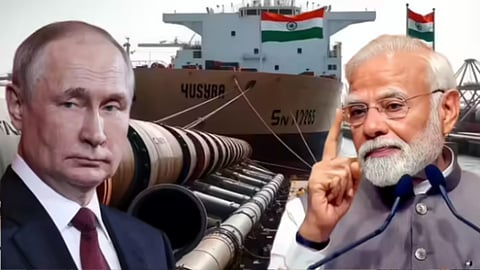Crisis Bell Rings for India! Conspiracy Meeting of 8 Countries
In Brief
The energy crisis facing India seems to be taking a serious turn.
The situation is predicted to become more complicated for India.
India imported crude oil in large quantities from this country.
The energy crisis facing India seems to be taking a serious turn. After the sanctions imposed by the United States on Russia, the decision taken by the OPEC Plus group is predicted to further complicate the situation for India. There are indications that the supply of crude oil in the international market is becoming limited, which could affect everything from petrol-diesel prices to the fiscal deficit.
India has imported a large amount of crude oil from Russia in recent times due to the availability of oil at lower prices. However, the United States recently imposed sanctions on two major Russian oil companies. As a result, India has temporarily halted oil purchases from these companies. Consequently, India is now looking for other suppliers, including Saudi Arabia, UAE, and Iraq, but since crude oil from these countries is relatively expensive, there is a possibility of increased costs.
Meanwhile, in the meeting held on November 3 by the OPEC Plus (OPEC+) group, two strategic decisions were announced. According to the first, there is a plan to increase daily production by about 137,000 barrels from December 2025, but this increase will be extremely limited compared to global demand. The second and more important decision is that in the first quarter of 2026, i.e., from January to March, the increase in production will be completely suspended. The next strategy will be formulated only after thoroughly understanding the demand-supply equation during this period.
These decisions are concerning for the Indian economy. India is one of the largest crude oil importers in the world, importing as much as 85% of its total fuel needs. If production limits remain, it is almost certain that oil prices will rise in the international market. This could directly impact India. The fuel bill will increase, the demand for dollars will rise, pressure will be created on the rupee, and ultimately, the likelihood of inflation will intensify. The fiscal deficit calculations could also be disrupted.
Although there has been no official response from the government yet, according to experts, India needs to accelerate its efforts to diversify energy sources. Options like LNG imports, renewable energy, and increasing strategic reserves will become more important.
The coming months are extremely decisive. The combined effect of reduced supply from Russia, OPEC Plus's cautious production policy, and global geopolitical tensions could be seen on the Indian market. All eyes are on the possibility of an increase in petrol and diesel prices. It will be important to see how strategically prepared the government is to tackle these challenges.

